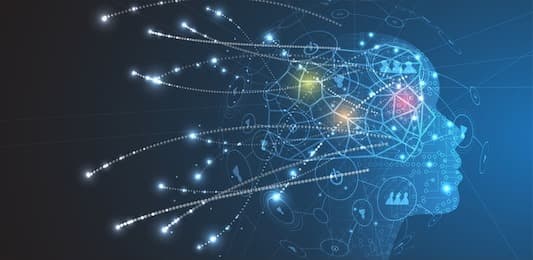Top deep learning repositories on Github!
- 11-07-2018
- programming

Share:
Copy
Deep Learning is a new area of Machine Learning research, which has been introduced with the objective of moving Machine Learning closer to one of its original goals: Artificial Intelligence. Deep learning is part of a broader family of machine learning methods based on learning data representations, as opposed to task-specific algorithms. Learning can be supervised, semi-supervised or unsupervised.
The "deep" in "deep learning" refers to the number of layers through which the data is transformed. Deep learning models are inspired by information processing and communication patterns in biological nervous systems yet have various differences from the structural and functional properties of biological brains.
Deep Learning is a vast field and cannot be understood without proper time investment into the field as one have to learn many theory maths and algorithms. The true power of Deep Learning lies in the Learning or Training process. To get started here is the top frameworks and projects regarding Deep Learning on GitHub.
Here's a list of top 180 deep learning Github repositories sorted by the number of stars and popularity.
1: tensorflow
Computation using data flow graphs for scalable machine learning. TensorFlow is an open source software library for numerical computation using data flow graphs. The graph nodes represent mathematical operations, while the graph edges represent the multidimensional data arrays (tensors) that flow between them. This flexible architecture enables you to deploy computation to one or more CPUs or GPUs in a desktop, server, or mobile device without rewriting code.
2: keras
Deep Learning for humans. Keras is a high-level neural networks API, written in Python and capable of running on top of TensorFlow, CNTK, or Theano. It was developed with a focus on enabling fast experimentation. Being able to go from idea to result with the least possible delay is key to doing good research.
3: opencv
Open Source Computer Vision Library. OpenCV (Open Source Computer Vision Library) is released under a BSD license and hence it’s free for both academic and commercial use. It has C++, Python and Java interfaces and supports Windows, Linux, Mac OS, iOS and Android. OpenCV was designed for computational efficiency and with a strong focus on real-time applications. Written in optimized C/C++, the library can take advantage of multi-core processing. Enabled with OpenCL, it can take advantage of the hardware acceleration of the underlying heterogeneous compute platform.
4: caffe
Caffe: a fast open framework for deep learning. Caffe is a deep learning framework made with expression, speed, and modularity in mind. It is developed by Berkeley AI Research (BAIR) and by community contributors. Yangqing Jia created the project during his PhD at UC Berkeley. Caffe is released under the BSD 2-Clause license.
6: machine-learning-for-software-engineers
A complete daily plan for studying to become a machine learning engineer.
8: Deep-Learning-Papers-Reading-Roadmap
Deep Learning papers reading roadmap for anyone who are eager to learn this amazing tech!
9: pytorch
Tensors and Dynamic neural networks in Python with strong GPU acceleration. PyTorch is a Python package that provides two high-level features: Tensor computation (like NumPy) with strong GPU acceleration Deep neural networks built on a tape-based autograd system. You can reuse your favorite Python packages such as NumPy, SciPy and Cython to extend PyTorch when needed.
11: Detectron
FAIR's research platform for object detection research, implementing popular algorithms like Mask R-CNN and RetinaNet. Detectron is Facebook AI Research's software system that implements state-of-the-art object detection algorithms, including Mask R-CNN. It is written in Python and powered by the Caffe2 deep learning framework. The goal of Detectron is to provide a high-quality, high-performance codebase for object detection research. It is designed to be flexible in order to support rapid implementation and evaluation of novel research.
13: incubator-mxnet
Lightweight, Portable, Flexible Distributed/Mobile Deep Learning with Dynamic, Mutation-aware Dataflow Dep Scheduler; for Python, R, Julia, Scala, Go, Javascript and more
14: data-science-ipython-notebooks
Data science Python notebooks: Deep learning (TensorFlow, Theano, Caffe, Keras), scikit-learn, Kaggle, big data (Spark, Hadoop MapReduce, HDFS), matplotlib, pandas, NumPy, SciPy, Python essentials, AWS, and various command lines.
22: convnetjs
Deep Learning in Javascript. Train Convolutional Neural Networks (or ordinary ones) in your browser.
23: deeplearning4j
Deeplearning4j, ND4J, DataVec and more - deep learning & linear algebra for Java/Scala with GPUs + Spark - From Skymind
24: awesome-deep-learning
A curated list of awesome Deep Learning tutorials, projects and communities.
25: ML-From-Scratch
Machine Learning From Scratch. Bare bones Python implementations of machine learning models and algorithms with a focus on accessibility. Aims to cover everything from data mining to deep learning.
26: dive-into-machine-learning
Dive into Machine Learning with Python Jupyter notebook and scikit-learn!
31: awesome-datascience
An awesome Data Science repository to learn and apply for real world problems.
32: char-rnn
Multi-layer Recurrent Neural Networks (LSTM, GRU, RNN) for character-level language models in Torch
34: handson-ml
A series of Jupyter notebooks that walk you through the fundamentals of Machine Learning and Deep Learning in python using Scikit-Learn and TensorFlow.
37: Machine-Learning-Tutorials
machine learning and deep learning tutorials, articles and other resources
38: openpose
OpenPose: Real-time multi-person keypoint detection library for body, face, and hands estimation
46: stanford-tensorflow-tutorials
This repository contains code examples for the Stanford's course: TensorFlow for Deep Learning Research.
47: CycleGAN
Software that can generate photos from paintings, turn horses into zebras, perform style transfer, and more.
60: neuraltalk
NeuralTalk is a Python+numpy project for learning Multimodal Recurrent Neural Networks that describe images with sentences.
62: py-faster-rcnn
Faster R-CNN (Python implementation) -- see https://github.com/ShaoqingRen /faster_rcnn for the official MATLAB version
66: pytorch-CycleGAN-and-pix2pix
Image-to-image translation in PyTorch (e.g., horse2zebra, edges2cats, and more)
67: tensor2tensor
Library of deep learning models and datasets designed to make deep learning more accessible and accelerate ML research.
69: amazon-dsstne
Deep Scalable Sparse Tensor Network Engine (DSSTNE) is an Amazon developed library for building Deep Learning (DL) machine learning (ML) models